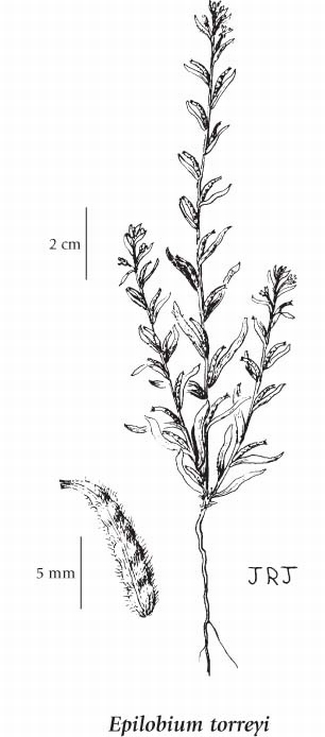brook spike-primrose (Torrey's willowherb)
Onagraceae (Evening Primrose family)
Introduction to Vascular Plants
Photograph
© Norman Jensen (Photo ID #8379)
Introduction
This tiny June-flowering species occurs in seasonally wet shallow depressions (vernal pools and associated habitats) from southwest British Columbia to northwest California, including Idaho and Nevada. In BC, it is known from two sites on southern Vancouver Island. It is a habitat specialist with strict growing requirements as is typical of vernal pool species. Rainfall and groundwater provide moisture requirements, and nutrient levels are low at these sites. Seeds germinate following submersion in winter and spring, however dispersal capabilities of the species are low.
No plants of this species have been observed at the two known sites since 1966 and 1993 respectively, and the species is potentially extirpated from BC. It is possible that the seed bank for this species persists and that restoration work at the sites might provide a way to rescue the species where invasive species might be influencing persistence. However, water deficits in regional groundwater recharge were observed during climate data analysis and may have contributed to population loss and invasions at these sites. Read the COSEWIC status report for this species. |
Species Information
General:
Annual herb from a taproot; stems ascending to erect, 10-60 cm tall, usually branched from base, peeling below; plants greyish spreading-hairy.
Leaves:
Opposite only near base, linear or narrowly lanceolate, reduced above, entire or remotely fine-toothed, hairy but glabrous near base; nearly stalkless.
Flowers:
Inflorescence loose to somewhat crowded in leafy, terminal spikes, glandular, flower-leaves similar to others but entire and smaller; flowers generally fertilized in the bud, not opening; hypanthium 0.4-1 mm long; petals 1-3 mm long, pink or white; sepals 0.7-2 mm long; stigmas rarely 4-lobed.
Fruits:
Capsules, cylindric, about 8-13 mm long, flexible, curved near tip, long-hairy, short-beaked, 4-chambered; valves adhering to partitions, the axis breaking-up as seeds shed; seeds 6-8 per chamber, 1-1.5 mm long, netted, glabrous, without a tuft of hairs.
Illustration

If more than one illustration is available for a species (e.g., separate illustrations were provided for two subspecies) then links to the separate images will be provided below. Note that individual subspecies or varietal illustrations are not always available.
Illustration Source: The Illustrated Flora of British Columbia
Habitat and Range
Moist grasslands and open slopes in the lowland zone; rare on SE Vancouver Island; S to ID, NV and CA.Status Information
| Origin Status | Provincial Status | BC List (Red Blue List) | COSEWIC |
|---|---|---|---|
| Native | SH | Red | E (Dec 2018) |
BC Ministry of Environment: BC Species and Ecosystems Explorer.
Synonyms
Synonyms and Alternate Names:
Boisduvalia stricta (A. Gray) Greene
Gayophytum strictum A. Gray
Similar Species
Epilobium densiflorum, also a rare species in BC, resembles E. torreyi and the two species may occur together in the same habitat. Epilobium densiflorum has petals (2.5) 3 - 8 (12) mm, capsules slenderly fusiform and beakless, internal septae of the capsules free from the valves, crowded flowers, and leaves lanceolate to ovate (Douglas et al. 1999; COSEWIC 2006d).
Source: British Columbia Conservation Data Centre |
Taxonomic Notes
References
Klinkenberg, Brian and Rose Klinkenberg. 2007. Draft National Recovery Strategy for Brook Spike-primrose (Epilobium torreyi) in Canada. Parks Canada, Victoria.